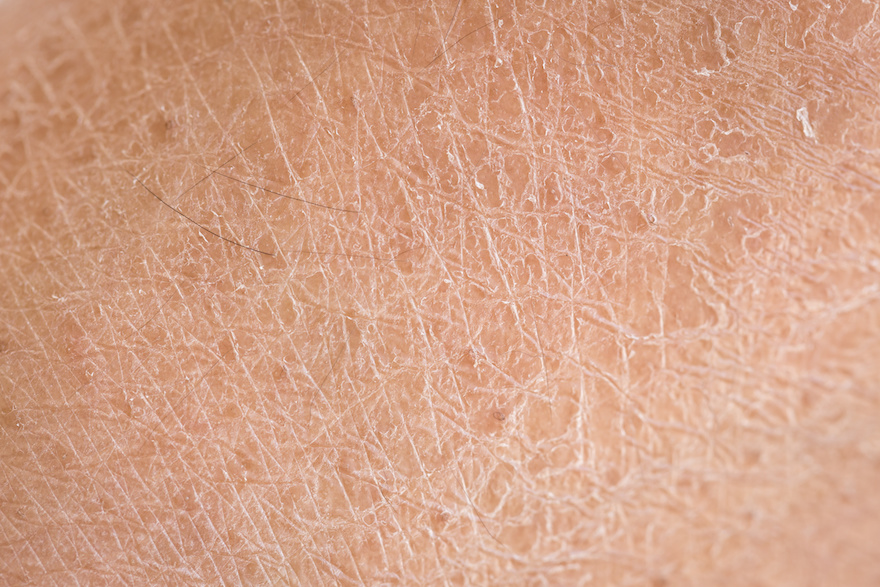If your skin feels like the Sahara Desert, it’s easy to assume that it’s dry, and just leave it at that. But just because your face is peeling or feels tight doesn’t mean it’s simply dry. Your skin might actually be dehydrated. Dehydrated skin lacks water and needs to be hydrated, whereas dry skin lacks oil and needs to be moisturized. Sometimes it’s hard to tell the difference though, so allow us to further break it down for you.
Dehydrated Skin
Dehydration is a skin condition that can be experienced by anyone, with any skin type, even if your skin is also dry. The same way your body can be dehydrated from a lack of drinking water, your skin can be dehydrated from a lack of water-rich products. Over half of your body is made of water, so if the water levels are depleted on the inside, it’s sure to show on the outside as well. Your skin cells will shrink and become brittle when they are dehydrated, which makes them more prone to bacteria and toxins which can affect skin health.
How can I tell if my skin is dehydrated?
Your skin feels oily and dry simultaneously
Your skin tends to change texture based on your environment, the products you use, and your diet.
You tend to break out occasionally, and unexpectedly.
Your skin is dull, congested, and flakes easily.
If you’re still not convinced — try the pinch test! Pinch your skin between two fingers. If it bounces back (meaning it lays flat again) right away, you’re hydrated. If it takes longer to fall, it’s likely you’re dehydrated. Also, it’s important to note that your skin doesn’t have to be dry to be dehydrated. Combination and oily skin types can also experience dehydration.
How can I treat dehydrated skin?
For starters, make sure you’re drinking plenty of water each day. Avoid washing your face with extra hot water, which can dry out your skin because it opens your pores and allows moisture to escape your body. Then, make sure you’re utilizing water-rich topical products to hydrate that complexion — gels, serums, mists, and hydrators are great, as opposed to more standard lotions or creams.
Dry Skin
If you have a dry skin type, this is likely something you experience all over, from your face, to your scalp to your lips. Having dry skin is a skin type, whereas any skin type can become dehydrated. If you are susceptible to dry skin, it’s likely what you were born with (thanks mom & dad). Dry skin lacks oil and soaks up whatever you apply to it very quickly, leaving you feeling dry again almost instantly.
How can I tell if my skin is dry?
- Your entire body feels dry, and you constantly need moisturizer
- You’ve got no natural sebum (oil)
- You’ve always had dry skin
- Your skin feels dull, flaky, itchy, and tight
How exactly do you tackle dry skin?
People with dry skin are more susceptible to signs of aging, so if you are one of the dry types, be sure to layer on plenty of oil-rich skin and body care products, and don’t forget SPF! Use a moisturizer that contains SPF, so you don’t have to think twice about incorporating it into your daily routine, and can maintain hydrated and protected skin. Find one that is broad-spectrum so it protects you from UVB and UVA rays.
What products are best for dry and dehydrated skin?
There a lot of commonalities between dry and dehydrated skin: they both appear dull, tight, itchy, flaky and sensitive.
If your skin is dry, oil-rich products, like oil-based cleansers are right for you. Avocado oil, jojoba oil, and coconut oil should all be ingredients on your radar — and they can be in everything from your serums to your body lotions. In addition, hyaluronic acid and squalane are a great combination hydrator, that is ideal for all types of parched, thirsty skin. Hyaluronic acid is also a humectant ingredient, along with ceramides and aloe vera. Humectant ingredients bind and retain moisture, and are especially good for skin that is more on the dehydrated side.
Drinking plenty of water helps your skin shine from the inside regardless of whether your skin is dry or dehydrated. Consuming healthy fats like avocado, olive oil, salmon and nuts, which are high in omega-3, also improves the overall health of your skin, and should be something you’re doing regardless of whether you’re feeling extremely dry or dehydrated.






Off skin, but I have terrible dark hairs that grow on my chin. I pluck everyday What can I do? Thank you!